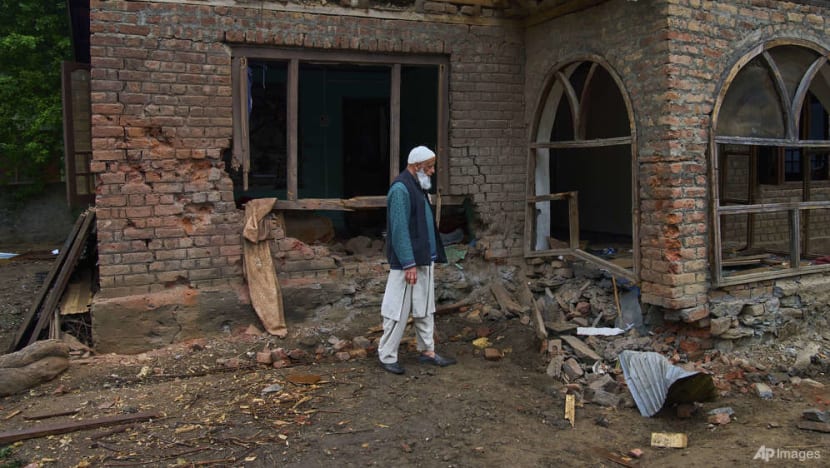Singapore 'gravely concerned' about India-Pakistan 'military confrontation'; calls for de-escalation

An elderly Kashmiri villager, Mohammad Saleem, inspects a damaged house after overnight shelling from Pakistan in Gingal village in Uri district, Indian-controlled Kashmir, on May 9, 2025. (Photo: AP/Dar Yasin)

This audio is generated by an AI tool.
SINGAPORE: Singapore on Friday (May 9) said it was "gravely concerned" about the ongoing "military confrontation" between India and Pakistan, urging both parties to calm tensions.
"Singapore is gravely concerned about the ongoing military confrontation between India and Pakistan following the heinous terror attack in Pahalgam, Jammu and Kashmir, on Apr 22," the Ministry of Foreign Affairs (MFA) said in a statement.
"We call on both parties to de-escalate tensions through diplomatic means and ensure the safety of all civilians."
Singapore on Apr 23 strongly condemned the attack. Separately, it also advised its citizens to defer all non-essential travel to Jammu and Kashmir in India, and to Pakistan, and urged travellers to exercise caution, particularly in border regions between Pakistan and India.
The worst violence between the nuclear-armed neighbours in two decades comes two weeks after New Delhi blamed Islamabad for backing an attack on tourists in the Indian-run side of disputed Kashmir on Apr 22 that left 26 people dead. Pakistan has rejected India's claims, calling for an independent investigation into the attack.
The attack was followed by retaliatory Indian air strikes on "terrorist camps" on Wednesday, and the two countries have exchanged cross-border firing and shelling, and sent drones and missiles into each other's airspace since then.
More than 50 people have already been killed in the violence.
OTHER CALLS FOR DE-ESCALATION
Countries from around the world, from the United States to China, have urged the two rivals to calm tensions, with US Vice President JD Vance on Thursday reiterating US calls for de-escalation.
"We want this thing to de-escalate as quickly as possible. We can't control these countries, though," he said in an interview on Fox News.
Several countries have offered to serve as mediators, and Iranian Foreign Minister Abbas Araghchi met his Indian counterpart Subrahmanyam Jaishankar in New Delhi on Thursday, days after visiting Pakistan.
Saudi Minister of State for Foreign Affairs Adel Al-Jubeir was, meanwhile, scheduled to visit Pakistan on Friday, according to a senior Pakistani official.
Al-Jubeir, too, was in India on Thursday and also met Jaishankar, who said he "shared India's perspectives on firmly countering terrorism" with him.
Pakistani Defence Minister Khawaja Muhammad Asif told parliament that Islamabad is "speaking daily" to Saudi Arabia, Qatar and China about de-escalating the crisis.
Also addressing the crisis on Thursday was Amnesty International, which said that the warring sides "must take all necessary measures to protect civilians and minimise any suffering and casualties".
Since gaining independence from British colonial rule in 1947 and becoming separate nations, Hindu-majority India and Muslim-majority Pakistan have experienced a strained and often tense relationship.
Kashmir, a predominantly Muslim region, is divided between them but claimed in full by both.
It has been a central point of conflict between the two nations, with two of their three wars having been fought over its control.
















